Find out if you’re eligible for Jobseeker’s Allowance and other unemployment benefits such as Universal Credit. Learn how to apply and how much you will get.
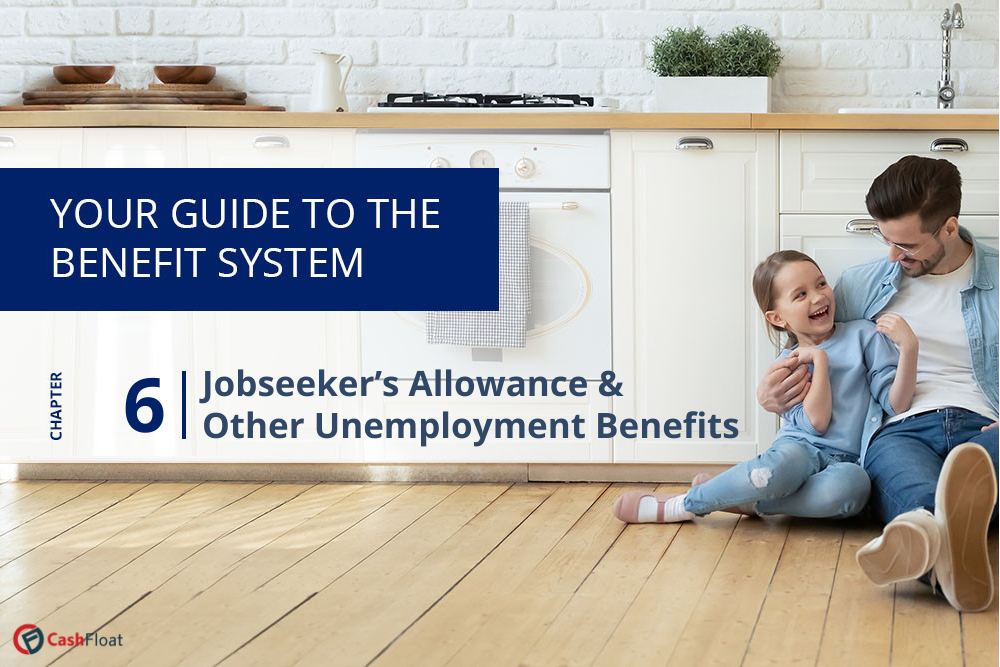
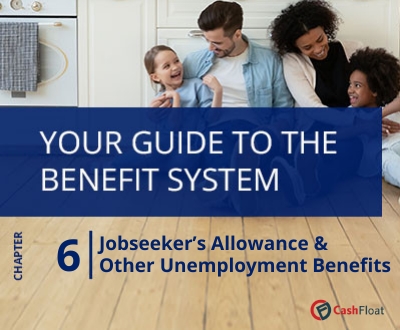
- To receive Jobseeker’s Allowance nowadays, you must have worked as an employee and made Class 1 National Insurance contributions within the last 3 years.
- The unemployed can also claim for Universal Credit. Some people will be eligible for both Jobseeker’s Allowance and Universal Credit.
There are some benefits you can receive from the state if you are out-of-work and looking for a job. In this chapter, we will mainly be looking at the Jobseeker’s Allowance and Universal Credit. These are the main sources of support available from the government for unemployed people. The ‘underemployed’ (usually those who work less than 16 hours per week) can also often receive the same support.
We will discuss who is eligible for these benefits, how to apply and how much you can expect to receive. We will also explain some other benefits that unemployed people can get.
Jobseeker’s Allowance
- Jobseeker’s Allowance is an unemployment benefit, which is paid every two weeks into your bank account if you are unemployed or work less than 16 hours per week. The amount you get depends on your age.
- Previously there were two types of Jobseeker’s Allowance: Contribution-based and Income-based. The government’s ‘new style’ Jobseeker’s Allowance was fully introduced in 2020 and now you can only apply for this.
- Not all unemployed people will be eligible for the new style Jobseeker’s Allowance. If you are eligible for Jobseeker’s Allowance, you may also be able to apply for Universal Credit as well.
- People who are not eligible for Jobseeker’s Allowance will have to apply for just Universal Credit.
- You can usually receive Jobseeker’s Allowance for 182 days (about 6 months)
- You apply online and must attend an interview at your local Jobcentre Plus Office taking documentation with you.
- At your interview, you sign a ‘Claimant Commitment’ outlining how you will look for work.
- You sign on every two weeks and if you do not keep to your ‘Claimant Commitment’, your benefit may be stopped.
Up until 2020 there were two types of Jobseeker’s Allowance: Income-based and Contribution-based. These have both been scrapped and new applicants for Jobseeker’s Allowance can only apply for the ‘new style’ Jobseeker’s Allowance.
To be eligible for Jobseeker’s Allowance, you must:
- Be unemployed or working less than 16 hours per week, on average.
- Have worked as an employee in the last 2-3 years and made Class 1 National Insurance contributions. Normally, self employed people are not eligible because they make Class 2 and 4 National Insurance contributions instead.
- Be over 18 (sometimes there are exceptions for 16-17 year olds).
- Be under the State Pension Age
- Not be in full-time education.
- Be available for work and actively looking for it.
- Have the right to work in the UK.
You can claim Jobseeker’s Allowance if your partner is in employment or has savings and you can claim it if you have savings yourself. None of these things are taken into account in your assessment for Jobseeker’s Allowance. However, if you and your partner have over £16,000 in savings between you or your partner is in employment, you may not be able to apply for Universal Credit on top of Jobseeker’s Allowance.
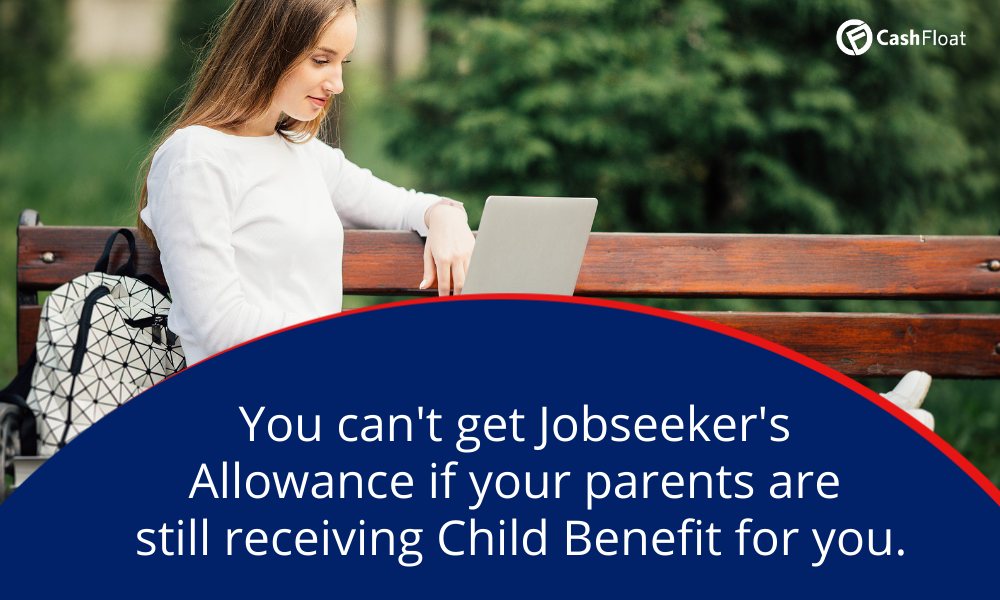
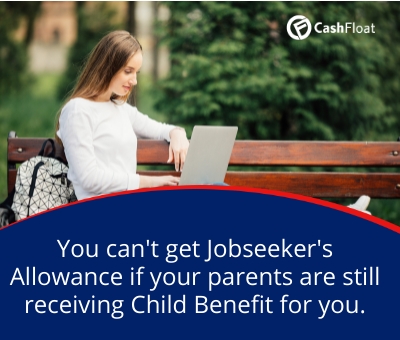
While you are eligible to receive Jobseeker’s Allowance at 18, most people aged 18 to 19 who have just finished full-time education and find themselves unemployed, will be unable to claim it because they are unlikely to have been employed and made any Class 1 National Insurance contributions. People aged 18-19 who find themselves unemployed and in financial hardship may be able to apply for Universal Credit instead.
Fast Payday Loans
If you’re confident you will be getting a job soon, you may be tempted to opt for fast payday loans to tide you over until your first paycheck. However, this is usually not a good idea as the job offer you are hoping for may fall through, or your salary may not be enough to cover the interest on the loan as well as your living expenses. Although it may take longer to arrange Jobseeker’s Allowance, Universal Credit or another benefit, it is usually worthwhile doing so. Cashfloat does allow people to apply for loans if unemployed, but our loans are designed for people who are in full-time employment and can be very expensive if not paid back on time.
How To Claim Jobseeker’s Allowance
You can apply for Jobseeker’s Allowance online, unless you are under 18. If you are under 18 and you are eligible, you can contact Jobcentre Plus for instructions on how to apply. The process for applying in Northern Ireland is slightly different than in the rest of the UK and is done through Nidirect.
You will need to supply your National Insurance number, your bank account or building society account details (or those of someone you trust to take the payment), your employment details for the last 6 months and statement letters for any private pensions that you have.Normally, within two working days of making your claim, you will receive a text or phone call to arrange a job interview at your local JobCentre Plus Office.
| How much Job Seekers Allowance will I receive? | |
|---|---|
| Age | Weekly Payment |
| 18-24 | Up to £72.90 |
| Over 25 | Up to £92.05 |
Backdating a Claim for Jobseeker’s Allowance
It is possible to backdate a claim for Jobseeker’s Allowance by up to 3 months if your claim was delayed for certain reasons. If you had a bereavement in your immediate family or you were given incorrect advice about your entitlement to Jobseeker’s Allowance and this delayed your application, then you can make this known when you apply and have your payment backdated.
Jobseeker’s Allowance Interview
In order to receive Jobseeker’s Allowance, you will need to have an interview at your local JobCentre Plus with your work coach and sign a ‘claimant commitment’. At your Jobseekers Allowance interview, you will discuss which measures you will take to find a job such as registering at a recruitment agency or writing a CV. You will also state how many hours you will spend looking and then sign the ‘Claimant Commitment’. Make sure that you attend the interview, otherwise you will not receive Jobseeker’s Allowance.
Jobseeker’s Allowance interview – What to bring:
- Your P45 (if you have one)
- Original identity documentation (such as a recent passport or driving licence)
- Two pieces of secondary identity documentation.
- One to prove your current address such as a recent utility bill or bank statement
- One to prove your date of birth such as your birth certificate.
After Your Job Seekers Allowance Interview
Once you have attended your interview, you must return to the JobCentre Plus Office every two weeks to sign on.
You should take along with you all the proof that you have been looking for work such as job applications you have made. If your work coach feels that you have not kept to your agreement to look for work, you may be ‘sanctioned’. This means your payments will stop; being ‘sanctioned’ can last anything from 4 weeks to 26 weeks (6 months). It is important to avoid getting sanctioned as this can lead to taking out a small personal loan online.

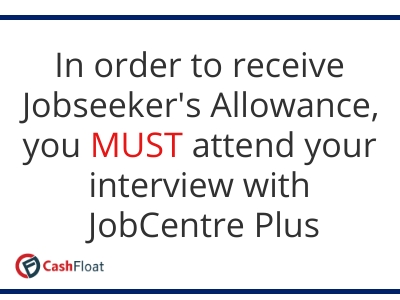
Universal Credit
Most unemployed people, or those who work less than 16 hours per week will be eligible to receive Universal Credit. Some people who are eligible for Jobseeker’s Allowance will also be eligible to receive Universal Credit, while some people will only be able to receive Universal Credit.
One of the main reasons behind the introduction of Universal Credit was to make it easier for the unemployed to find work. Under previous benefits systems, support would be completely cut as soon as a person found employment (no matter how much income that employment provided). This made it difficult for people to take on low paid work or work that was not full time. Under Universal Credit, your benefits are gradually reduced as you do more work.
The government provide Universal Credit to support people in many situations, not just when they are unemployed. Here’s what you need to know about Universal Credit for the unemployed:
- Most unemployed people or those who work less than 16 hours per week will be able to receive Universal Credit.
- Your eligibility and the amount that you receive depends on your circumstances. You can use the government’s benefits calculator to see if you are eligible and how much you could receive.
- In order to claim, normally you have to be over 18 years of age, although in some circumstances 16 and 17 year olds can apply.
- Either you or your partner must be below the state pension age and you and your partner must have less than £ 16,000 in savings between you.
- If you have a partner and you both live in the same household, you will have to make a joint claim. This will affect the amount that you can claim.
- On top of the standard allowance, you could receive more if you have children, if you have a disability or health condition, if you care for a disabled person or if you need help to pay for your housing costs.
What the Unemployed can Receive from Universal Credit
Many unemployed people or those who work less than 16 hours per week will be eligible for Universal Credit. The amount that people can receive depends on their circumstances. If you are eligible for Universal Credit, you will receive a standard amount, with additional payments on top of this if you qualify for support for additional needs.
Claims for Universal Credit can be made online and payment for it is usually made into your bank account every month. If you live in Scotland, you may be able to receive payments every 2 weeks.
| What is the Standard Allowance? | |
|---|---|
| Amount | |
| If you are single and under 25 | £316.98 |
| If you are single and over 25 | £400.14 |
| If you apply as a couple and you’re both under 25 | £497.55 |
| If you apply as a couple and you’re both over 25 | £628.10 |
What extra amounts can I get?
If you meet the requirements, then you may be able to receive extra money on top of the standard allowance.
Extra money is available for people who have children. If you have children, you could receive up to £333.33 if you have one child and up to £292.81 per child if you have more than one. If you have a disabled child, you could receive up to £495.87. People who have a disability or a health condition could receive up to £423.27 and people who care for a severely disabled person could receive up to £201.68.
If you do apply for Universal Credit, the benefit provider will assess your needs when you make your claim. You may find that you are eligible to receive support to pay for the costs of your housing. Support is available to people who rent privately, people who rent from a local authority or housing association or people who own their own homes.
How will the Benefit Cap Affect my Payments?
If you are eligible to receive extra payments the benefit cap can affect the total amount that you will receive. The benefit cap is a limit on the total amount that people can receive in benefits.
Benefit cap amounts per month
| Inside Greater London | Outside Greater London | |
|---|---|---|
| If you apply as a couple | £2110.25 | £1,835 |
| If you’re a single parent and children live with you | £2110.25 | £1,835 |
| If you’re a single adult | £1413.92 | £1,229.42 |
Did you know there is a grace period immediately after you begin claiming Universal Credit, in which the benefit cap does not apply? The benefit cap won’t affect you for up to 9 months, immediately after you are awarded Universal Credit, if:
- You’re claiming it because you stopped working or your earnings went down.
- You are earning less than £604 per month.
- For the 12 months before you became eligible for Universal Credit, you earned at least £604 per month.
Other Benefits for the Unemployed
While the two main benefits available for the unemployed are Jobseeker’s Allowance and Universal Credit, in some circumstances people who find that they are unemployed and facing financial hardship may also be eligible for other benefits.
Statutory Redundancy Pay
While it is not a government provided benefit, many people who become unemployed will be entitled to receive statutory redundancy pay from their employer. If you have been made redundant by an employer who you worked for for over 2 years, then you will normally be entitled to redundancy pay and you should make sure that you receive it.
Who is Eligible?If you are made redundant by an employer who you have worked for for over 2 years, then you will probably be entitled to redundancy pay. Redundancy normally counts as being dismissed from your job, because your employer is no longer able to keep you on.
You will not get redundancy pay if you resign from your job or if you are dismissed for misconduct. On some occasions, employers may be able to offer suitable alternative employment (e.g. they allow you to continue working for them in a different role). If your employer is able to offer you this and you refuse it, then you also won’t be able to get redundancy pay.
How much will I get?All redundancy pay under £30,000 is tax free and so most people won’t have to pay tax on anything they are due. If you are entitled to redundancy pay, you will get:
- Half a week’s pay for each full year of your employment that you were under the age of 22.
- One week’s pay for each full year of your employment that you were over the age 22.
- One and a half week’s pay for each full year of your employment that you were over the age of 41.
Your weekly pay is calculated as the average amount that you earned per week for the 12 weeks before you got your redundancy notice. The maximum length of employment that you can claim for is 20 years.
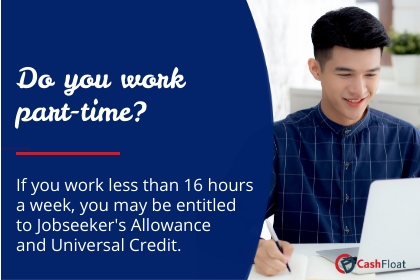
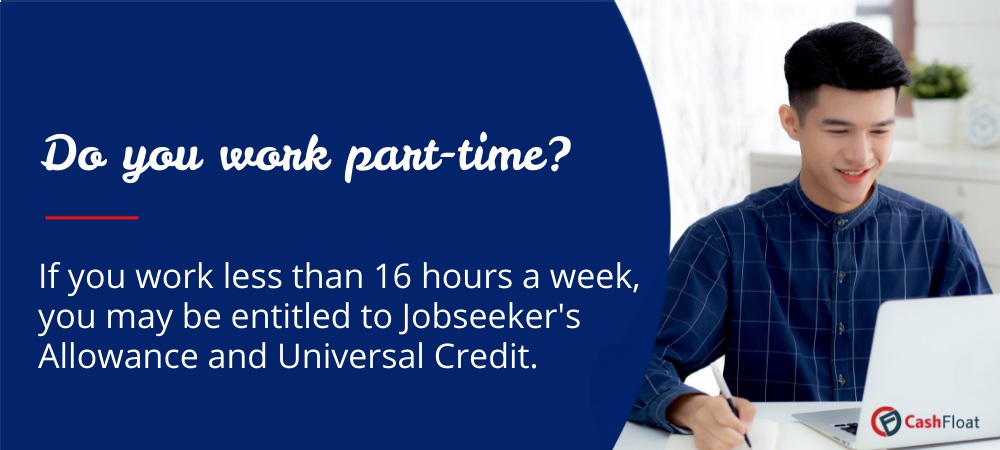
Employment and Support Allowance, and Other Disability Benefits for the Unemployed
People who find that they are unemployed or are only able to work a limited number of hours because of a disability or a health condition may be entitled to Employment and Support Allowance or other disability benefits.
Employment and Support Allowance
Anyone who is under the state pension age and has paid enough National Insurance contributions, and who also has a disability or a health condition that limits the amount that they can work, will be eligible to receive Employment and Support Allowance.
You will not be able to receive Employment and Support Allowance if you are claiming Jobseeker’s Allowance, but you may be able to receive Universal Credit at the same time.
How do I Apply?In order to qualify for Employment and Support Allowance, on top of meeting some other requirements, you will need to prove that your illness or disability affects the amount that you are able to work. In order to do this, you will normally need to complete a Work Capability Assessment. This will involve completing a ‘capability for work questionnaire’ and will also, usually, involve having an appointment with a healthcare professional from the Health Assessment Advisory Service.
Applications can be made online. In order to apply, you will need to provide your National Insurance number, your bank or building society account details (or those of someone you trust to take the payment), your doctor’s name, address and telephone number, details of what you earn if you are able to work at all and the date that your Statutory Sick Pay will end if you are claiming it.
Other Disability Benefits for the Unemployed
Depending on the severity of your disability or illness you may be able to claim other disability benefits, if your unemployment or inability to work a normal number of hours is caused by disability or illness. Other benefits that you may be able to claim include Personal Independence Payment and Attendance Allowance.
Can I get Jobseeker’s Allowance if I am a student?
If you are a full-time student, you cannot receive Jobseeker’s Allowance until your course officially ends. If you have children, however, you might be able to get it during the summer holidays. Part-time students can receive JSA, but only on the condition that they take any job offered to them and do everything they can to look for work.
Will the Jobcentre Plus help me find a job?
Your work coach will give you advice about improving your chances of getting a job. They might suggest you take a Work Programme. This can be work experience and training of up to 2 years or sector-based training of up to 6 weeks in specific industries.
What happens if I am ‘sanctioned’ and my Jobseeker’s Allowance is stopped?
If you cannot pay for your basics such as food, you may also get a ‘Hardship Payment‘. You would have to prove that you have done everything in your power to find money elsewhere, such as borrowing. The amount that you can receive depends on your circumstances. If you are single and under 25, the minimum that you can receive is £36.63.
Can I work if I am on Universal Credit?
Universal Credit is designed to allow people to begin work while they are still on Universal Credit. You will still receive payments if you start work. As you earn more you will get less Universal Credit.


